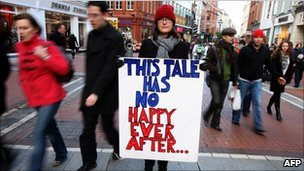 The Irish Republic has insisted it does not need European Union assistance amid speculation it is under pressure to use an EU bail-out fund.
The Irish Republic has insisted it does not need European Union assistance amid speculation it is under pressure to use an EU bail-out fund.Dublin said it was in contact with "international colleagues".
But it dismissed reports that it may approach the European Financial Stability Fund (EFSF) for up to 80bn euros (£68bn; $110bn) as "fiction".
Meanwhile, Portugal has called on the Republic to act for the good of the eurozone, as well as its own interests.
"I want to believe they will decide to do what is most appropriate together for Ireland and the euro," Portugal's Finance Minister Teixeira dos Santos said.
The EU can only offer a bail-out if Dublin requests it - but there are fears that if this did not happen there would be greater contagion elsewhere.
However, a succession of Irish government ministers said there had been no suggestion of turning to Europe for help.
"The argument that Ireland is about to go banging on the door of the International Monetary Fund or needs to take an EU bail-out is simply wrong, but if it gets more legs, it could be very, very dangerous," European Affairs Minister Dick Roche told Irish radio.
'Vision'
A spokesman for Economic and Monetary Affairs Commissioner Olli Rehn said that pressure on Dublin to take a bail-out was not coming from the European Commissioner, but from "another player".
Last week, market anxiety spread to other heavily indebted eurozone nations, including Portugal and Spain, driving up their borrowing costs.
And Portugal's Teixeira dos Santos told the Financial Times there was now a high risk that Portugal would have to seek foreign financial aid.
"The risk is high because we are not facing only a national or country problem," he told the FT. "It is the problems of Greece, Portugal and Ireland. This is not a problem of only this country."
He stressed subsequently, however, that Portugal had no immediate plans to ask for assistance.
The yield on Irish bonds - essentially IOUs sold by the government to fund state spending - were trading lower on Monday, suggesting a slight easing of concerns.
The yield on the bonds has soared in recent weeks, indicating that investors believed there was an increased risk of the Republic defaulting on its debt.
'Concerns'
Ireland's difficulties will be discussed by EU finance ministers in Brussels on Tuesday.
However, the BBC's Europe editor Gavin Hewitt said that high-level talks had already begun, involving European Commission President Jose Manuel Barroso and his economy commissioner Olli Rehn.
"Some EU officials believe it would be better for the Republic to accept a bail-out package now rather than to allow uncertainty to continue," Gavin Hewitt said.
Brussels fears that any delay risks repeating the Greek crisis that earlier this year threatened the entire eurozone, he added.
A commission spokesman confirmed that it regarded the Irish finance position as serious, but denied that the government was being put under pressure to accept help.
"Yes, we are in close contact with the Irish authorities, yes there are concerns in the euro area about the financial stability of the euro area as a whole, once again," said Amadeu Tardio.
"But to say that there are strong pressures to push Ireland to any kind of scheme of this kind is an exaggeration," he added.
Bank plan
Some reports suggest that the Irish Republic could seek help for its banking sector alone, rather than asking for help at a government level.
This, say observers, would save them the embarrassment of being rescued by the EU and avoid greater involvement by Brussels in economic decisions.
The Irish government has all but nationalised the country's banking system, which had lent recklessly to property developers at a cost of 45bn euros.
'Stand alone'
The government has consistently stated its determination to restore stability to the public finances and stressed that it was "fully funded" until 2011.
Meanwhile concerns persist about the state of the Greek economy, which received an EU bail-out worth up to 110bn euros.
European and IMF officials will be in the country this week to decide whether to release the final tranche of the money.
But over the weekend, Greek Prime Minister George Papandreou signalled it may have to ask for permission to delay its repayments.
The scale of the problems still facing Greece were further underlined by the latest official European figures which showed that its budget deficit in 2009 was markedly higher than previously stated.
Cuts impact
Since 2008, the Irish Republic has suffered a dramatic collapse of its property market.
House values have fallen between 50% and 60% and bad debts - mainly in the form of loans to developers - have built up in the country's main banks, bringing them to the verge of collapse.
The country has promised the EU it will bring its underlying deficit down from 12% of economic output to 3% by 2014.
Its current deficit is an unprecedented 32% of gross domestic product, if the cost of bad debts in the Irish banking system is included.
The Irish government, which has a flimsy majority in parliament, is expected to publish another draconian budget on 7 December.
This will impose spending cuts or tax rises totalling 6bn euros to bring the deficit down to between 9.5-9.75% next year.
Investors fear the budget cuts are likely to worsen the country's already deep recession, leading to further losses to the government via falling tax revenues and higher benefit payments.



